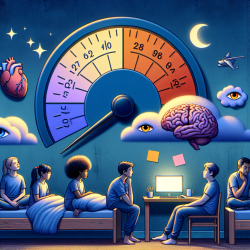As a practitioner working with adolescents, understanding the intricate relationship between sleep and cognitive performance is crucial. Recent research titled "Association between free-living sleep and memory and attention in healthy adolescents" provides valuable insights into how sleep affects cognitive functions like memory and attention. This blog explores these findings and offers practical strategies for practitioners to enhance their skills by implementing or further researching these outcomes.
The Importance of Sleep for Adolescents
The National Sleep Foundation recommends that teenagers aged 14 to 17 should aim for 8–10 hours of sleep each night. However, studies show that less than 30% of U.S. teens achieve this target, with many reporting only 7 hours or less. This lack of adequate sleep is linked to various negative health outcomes, including impaired cognitive function.
Key Findings from the Research
The study measured one week of free-living sleep using wrist actigraphy in 160 adolescents and assessed their working memory and visual attention through specific tasks. The results indicated that shorter sleep durations negatively impacted performance on challenging memory tasks. However, the relationship between weekly sleep patterns and cognitive task performance was less clear due to high night-to-night variation in sleep.
- Memory Tasks: Shorter time in bed the night before testing was associated with slower response times on difficult memory tasks.
- Attention Tasks: No significant correlation was found between sleep measures and performance on attention tasks.
Practical Strategies for Practitioners
Given these findings, practitioners can adopt several strategies to support better sleep habits among adolescents:
- Create Awareness: Educate students and parents about the importance of adequate sleep for cognitive performance.
- Encourage Consistency: Promote regular sleep schedules to minimize night-to-night variations.
- Counsel on Sleep Hygiene: Advise on creating a conducive sleeping environment free from distractions like electronic devices.
The Need for Further Research
The study highlights the need for further research to understand the complex dynamics between free-living sleep patterns and cognitive functions in adolescents. Practitioners are encouraged to stay informed about ongoing research developments to enhance their practice continually.
Association between free-living sleep and memory and attention in healthy adolescents










